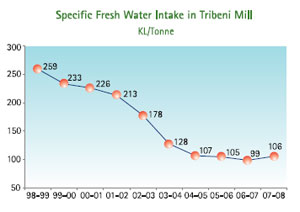 Tribeni unit Tribeni unit
The Tribeni mill, where larger quantities of water are
required for manufacture of specialty paper, has implemented
significant water reduction initiatives to achieve a 59%
reduction in specific fresh water intake since 1998-99.
Kovai unit
Our water conservation measures in the Kovai unit have
yielded positive results. The mill consumed only 17.31 KL of
fresh water per tonne of paperboards production in 2007-08
compared to 21.01 KL per tonne in 2006-07, a 17.6%
reduction.
Other Businesses undertook
proactive initiatives to minimise specific fresh water
consumption through water audits and implementation of
recommendations, deployment of best practices and
technologies along with greater employee participation.
The Cigarettes business continued to improve specific water
utilisation. The business used 4.9 KL of water per million
cigarettes (equivalent), an improvement of 8.2% compared to
5.4 KL per million cigarette (equivalent) in the previous
year. This compares favourably with the specific water
consumption of 4.85 KL per million cigarette (equivalent)
reported by British American Tobacco - British American
Tobacco - Sustainability Report 2007.
In 2007-08, Munger, Bengaluru and Saharanpur Cigarette
factories reduced specific water consumption by 14.1%, 8.4%
and 7.4%, respectively over the previous year.
Other units with exemplary performance in reducing specific
water consumption this year are the Packaging & Printing
unit at Tiruvottiyur (35.5%), Leaf Processing unit at
Anaparti (19.7%), ITC Hotels Maratha (17.1%) and Maurya
(11.1%).
|

